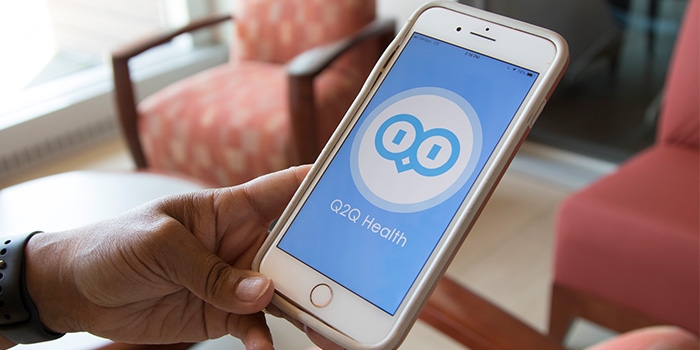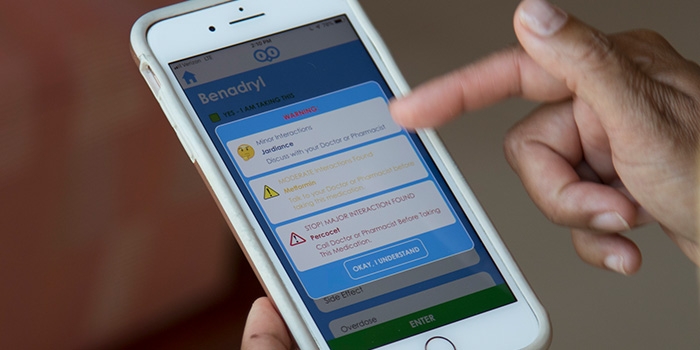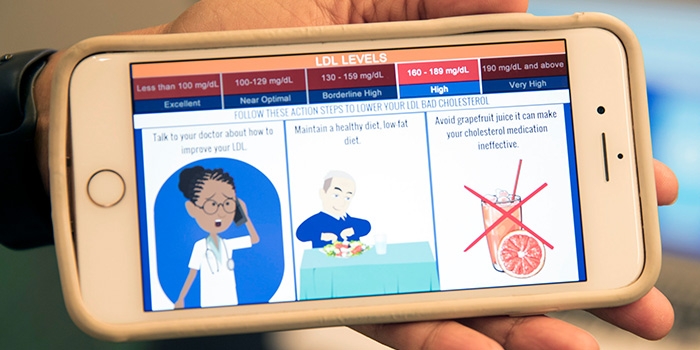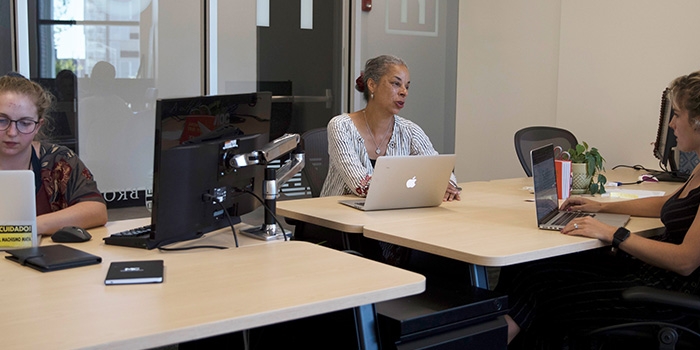Medical Data Isn’t the Problem. Understanding It Is.
- News & Events
- News
- Medical Data Isn’t the Problem. Understanding It Is.

Alumna Roberta Powell is competing for a share of more than $100,000 seed money for her new app that translates medical data for the layperson.
Roberta Powell ’09, a former nurse educator, may not be your typical app inventor, but her new tool for translating medical information into layperson’s terms is redefining the relationship between patients and their doctors. With her new app, all you need to do is enter the health data you don’t understand and the app will translate it into easy-to-understand language and images.
For too long, doctors have been the repositories of knowledge while patients have been told to simply trust what their doctors tell them, said Powell. She likens doctors to “high priests who interpret the scriptures for you.” If the high priest says it is gospel, then it must be gospel. Now there’s an app that puts knowledge into the hands of patients, allowing them to make informed decisions about their health.
Powell calls her tool Q2Q (Quantitative to Qualitative Health). It has three main functions: 1) it translates numbers in lab reports and other health data, 2) it provides general health information via animated videos and 3) it alerts you to adverse reactions when combining medications.

The most important function is apprising you of drug interactions, Powell said. The average person assumes that over-the-counter medications are harmless. Yet a common cold remedy could be dangerous or even fatal when combined with the wrong prescription drug.
If you’re unsure about a drug interaction, Powell said, just type in the name of the drug you’re currently taking and type in the name of the new drug you’ve been prescribed or think you need. If, for example, you’re on Percocet and want to take Benadryl for a cold, type in the names of the two drugs or scan Benadryl’s barcode and you’ll receive a pop-up message in bright red letters, alerting you to the fact that Percocet and Benadryl are a dangerous combination.
“According to the Food and Drug Administration, 1.5 million people are hospitalized each year for ADRs
[adverse drug reactions] at a cost of $136 billion a year,” Powell said. A tool like Q2Q minimizes the risk of ADRs and reduces the costs for health insurance companies, employers who self-insure, Accountable Care Organizations and the federal government, which funds Medicaid and Medicare.

Another important function of Q2Q is translating medical numeracy. “In health care, everything is numbers driven,” Powell explained. “If you have diabetes, you have to watch your blood sugar levels, lab values, insulin-to-carb ratios, dosages, etcetera. A lot of people just don’t understand those numbers, and when you don’t understand your numbers it’s hard to take action to do something about them.”
Q2Q breaks the numbers down for you. Say your cholesterol is 142. Type in 142, and a dial, like the needle on a bathroom scale, will flip over and stop at “borderline high.” You’ll be shown an image of what arteries with borderline high cholesterol looks like along with an image of what normal arteries look like. Finally, a computer-animated video will appear, providing action steps you can take to lower your cholesterol.

The seed for Q2Q was planted 14 years ago when Powell was diagnosed with breast cancer. “When you get a major diagnosis like cancer and there’s no easy way to understand the medical terminology or measurement system, you’re completely dependent on your doctor’s knowledge,” she said. “Even if you do your own research, it will still be written in doctor-speak and you won’t be able to understand it. My experiences made me want to address this problem and not have other people go through what I did.”
Powell decided to go back to school to earn a degree in nursing. At the time, she held a B.S. degree in economics with a minor in mathematics from Northeastern University (1985) and an M.P.A. degree from Harvard University (Kennedy School) (1999).
After completing her cancer treatment in 2005, Powell enrolled in Rhode Island College’s accelerated Bachelor of Science in Nursing program, graduating in 2009. She spent the next eight years as a clinical nurse educator, specializing in diabetes. Although Powell left clinical practice in 2017 to devote full time to creating her app, Powell continues to educate on health via her app.
In 2018 she formed her own company, Health Education and Learning, whose logo – an owl – represents knowledge. Ultimately, that is what Q2Q provides. Powell also hired a software developer, a database developer and an animator, while she wrote all of the content. In less than a year, a prototype was completed. Five patents are currently pending.

Recently, her startup was among 25 selected to compete in 2019 MassChallenge Rhode Island. Chosen out of more than 250 applicants from 25 U.S. states and 39 countries, Powell is competing for a share of more than $100,000 – seed money for her startup.
For four months (July through October), Powell is taking part in MassChallenge Rhode Island’s accelerator program, working out of the Cambridge Innovation Center in downtown Providence. There she attends weekly business development seminars, taps the expertise of mentors and makes use of state-of-the-art technology and other resources.
Winners of the MassChallenge prize will be announced on Thursday, Oct. 24. The following day, Friday, Oct. 5, Powell will present a TEDxBrownUniversity talk on Q2Q.
She describes Q2Q as her “calling.” “This is population health,” she said. In the United States, medical mistakes (human error) is the third leading cause of death after heart disease and cancer. A 2016 Johns Hopkins study found that more than 250,000 people die annually due to medical errors that include preventable adverse drug reactions, mixing drugs and mistakes with doses or types of medication.
Other studies place the death rate even higher at 440,000, noting that “death due to a medical mistake” is rarely written on death certificates.
Powell feels invigorated by the lifesaving potential of Q2Q. “With seed money and investors, I believe I can make this a reality,” she said.
You can download the free app on the Q2Q Health website.
Click here to view Q2Q video.
